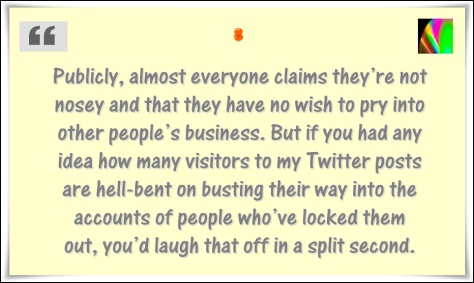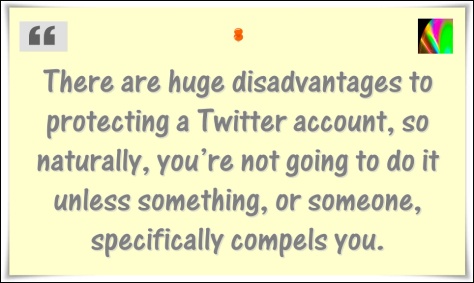
When most people see a protected Twitter account, they’ll either Follow it, ignore it, or, if my relevant blog stats are anything to go by, come to this site in a bid to find out how to covertly spy on it. But when I see a protected Twitter account, my initial instinct is none of the above. What I want to do, is find out why. Why did that user protect his or her account? There has to be a reason. There’s a reason for everything.
The catch-all answer to why people protect their Twitter accounts is of course that they’ve got something to hide. There are huge disadvantages to protecting a Twitter account, so naturally, you’re not going to do it unless something, or someone, specifically compels you.
But on a more detailed basis, the evidence I’ve used to determine the exact reasons people protect their accounts has undeniably been circumstantial. I’m not a mind-reader, and people almost never admit the real reasons behind such actions, so I couldn’t really have handled this in any other way. Simply, I’ve observed a large raft of public accounts over a number of years, and taken note of what’s been happening immediately before, and sometimes a little after, certain users decided to protect. I’ve then interpreted the most salient event around the time of the encryption as the reason behind it.
Very often, people will either have been caught out doing something they shouldn’t, or they’ll have been attacked by openly judgemental users for one or more facets of their behaviour.
EMBARRASSMENT
When someone is hit with the immortal phrase: “OMG! You so need to get a life!”, there are three basic ways things can go. They’ll either categorise the heckler as a jealous troll and continue unfettered, or they’ll recognise that there’s at least some significance to the comment and that people in general may be seeing them in an unfavourable light. If it’s the latter, they’ll either strive to change their behaviour (and probably fail after a pretty short time – because in the end, we are who we are), or they’ll protect their account in an attempt to avoid further confrontation.
When a protection is based on the above criteria, it can be very unstable. One day the account is protected, then the next it’s set back to public status again, then a few days later it’s once more protected… It’s a mental tug-of-war, and no situation is really ideal for the user. The user knows he or she is restricted when the account is protected, but equally he/she knows that when the account is public, the desired level of privacy isn’t there. Almost all cases in which Twitter accounts fluctuate back and forth between protected and public status are in my view due to a form of embarrassment on the part of the account holder.
When you’ve been observing this sort of stuff over a period of years, you can even predict when people are going to protect their accounts. You get good at noticing accounts that display the trademark characteristics of a potential ‘lock-down’, and you keep an eye on them. Then you see a third party chime in with a comment which embarrasses the user, or you see the user get confronted over some dodgy activity, and you think: “Yep, that account will be protected by tomorrow morning.” And lo and behold, it is. It’s not rocket science – a protected Twitter account is usually a reaction, and a perceived solution, to some form of personal adversity.
FAILURE
But the reasons people protect are not necessarily nefarious. A protected account doesn’t automatically mean the holder is running scams, living a lie, using a fake ID or behaving like a creep. Some people are just not having the success or meeting with the levels of approval they expected, and the thought of someone witnessing their failure embarrasses them. They don’t want to abort their quest, whatever it may be, but neither do they want an audience looking on and potentially gossiping about their failure.
What exacerbates this further is the fact that everyone on Twitter can measure their own success against the prosperity of others. If someone you know gets ten replies to every tweet, and you’re getting one reply to every ten, there’s a psychological sense of inferiority. Hiding your interactions from the wider world (and particularly your much more successful acquaintance) can seem like the obvious quick fix.
OH GOD, DID I REALLY SAY THAT???
Offsite re-posting can be a huge impetus for account protection too. The classic case involves random people (often using covert means to keep an eye on the user, and not actually following the account) re-posting Tweet content to other, unrelated sites. Perhaps news sites, or forums – anywhere with a high profile and a high level of permanence. You can guarantee when this kind of thing happens, that the material getting re-posted will be that which the original user would least want to be made permanent on a news site. It’ll be the love tweets they posted when they were drunk, the row they had with their partner… Certainly not something that makes them look or feel good.
In fact, protecting an account often does little to prevent this kind of ‘leak’, but it’s a natural, knee-jerk reaction for a user who’s seeing stuff they wish they’d never said in the first place, plastered all over Google. It’s locking the stable door after the horse has bolted, but people still do it.
THWARTING STALKERS
Most remarkably, it’s extremely common to find accounts which appear to have been protected purely to hide something from one specific person! It’s hard to believe that someone would go to the lengths of locking down an entire social media account and sacrificing a wide range of benefits in the process, just to keep one person’s eyes off their business. But the fact is they do. And again, judging by some of the search terms I’ve seen in the course of writing Twitter-related posts, the individuals those account holders want to keep out can be extremely dogged, desperate even, to get back in.
Publicly, almost everyone claims they’re not nosey and that they have no wish to pry into other people’s business. But if you had any idea how many visitors to my Twitter posts are hell-bent on busting their way into the Twitter accounts of people who’ve locked them out, you’d laugh that off in a split second.
Day after day, week after week, month after month, a new army of would-be virtual spies takes to the search engines, literally crazed with the desire to crack open Twitter’s account encryption, and monitor people who’ve expressly locked them out of their lives. The level of doggedness can be quite scary, and this certainly goes some way towards explaining why some Twitter users will protect an account just to ostracise one individual. Stalking is a serious issue, and it only takes one stalker to make someone’s life a misery. If you can lock that stalker out with the click of a button, it’s worthy of consideration – even when there’s a price to pay.
FOLLOW CONTROL
Another reason people protect their Twitter accounts can be to control their following. Not necessarily because they want to stop people from seeing what they’re doing, but because of the impression one’s following can create. For instance, a user might have the same name as a political extremist and be getting follows from people with whom he or she expressly doesn’t want to be associated. True, the user can sit there blocking each and every account they don’t like the look of, but if the problem is fairly large in scale, it could be a lot easier for them to protect the account and just approve the followers they know.
Equally, people changing careers may not want to take the evidence of their old career with them into their new one. Because evidence of an old career is highly likely to show up in a Followers list and you can’t police your Twitter 24/7, a protected account with entry only for approved individuals may be the only sure preventative measure.
CROOKS AND BLAGGERS
Then of course there are the scoundrels. The users who are up to no good. The schemers, the imposters – the people who have to hide their affairs. These are users who predominantly exploit the gullible, and it’s vital for them that no one can tell those gullible people they’re being exploited. Protecting the account not only hides what’s being said from selected users – it also stops outsiders from checking the Follow lists and then contacting the people on them with a warning.
Imposters additionally have to hide from the people they’re impersonating, and scammers have to hide from the legitimate businesses whose trade they’re taking.
So whilst many protected Twitters have no nefarious connotations, commercially-orientated accounts in particular should be regarded with cautionary mistrust. If you’re trying to sell something, the whole point of being on Twitter is to be public and take advantage of the site’s viral nature. If you’re protecting a business account and sacrificing every publicity aid Twitter provides, there’s almost certain to be a con of some sort going on. Why would anyone protect a business account unless they were up to no good or phenomenally incompetent?
CREEPS
Creeps can in some cases be categorised as non-nefarious. They may just be awkward people who don’t really grasp effective social protocols very well. In these cases, account protection is unlikely, because the person is unaware of how their behaviour is perceived, and therefore won’t see a need to hide it.
Other creeps, however, know full well they’re up to no good. They’re manipulative. They know the people with whom they’re communicating don’t really want anything to do with them, but they employ creepy tactics to get their attention regardless. You know these creeps are aware that their behaviour is undesirable or even unacceptable, because they’re always trying to destroy their own ‘audit trail’. They’re likely to end up with protected accounts, but they’ll also commonly be deleting high percentages of tweets.
The worst creeps are the ones to whom you keep seeing people reply (usually in a rather stiff manner), but when you check their profile page their tweet count has always returned to zero. This type of creep will not be able to protect initially, because they can’t get anyone to follow them and would therefore be talking to themselves. Their solution is to delete their weirdo tweets within minutes of posting them – creating a sort of snatched privacy where most of the time, only the intended recipients of the tweets will see them. But after these people been on the site for a longer period, they may have managed to build a small following, at which point they’ll often lock their account and attempt to continue being creepy with their followers in private.
AND…
But there could be many other explanations for a protected Twitter account. I have one protected account and five public. The protected account was initially used to reserve a username, which I wanted for an important public account. I didn’t want the embarrassment of starting the public account with no followers, so I originally gave it a name people would not associate with me, and did all the unsavoury groundwork of building up a reasonably-sized following in that ‘anonymised’ guise. Once the public account was at a stage where it wasn’t going to embarrass me, I switched the username with the recognisable one I’d reserved in the protected account.
Why protect the reserve account? Because with a protected account that’s out of use, people assume the reason it’s got no followers is that the holder is not using it and therefore not approving any follow requests. You avoid the stigma of a slow trickle of interest until you’re ready to hit the ground running. It just made sense to do things that way.
Now that the protected account has the anonymised, redundant username, I’ve found another use for it. Is it anything I’ve mentioned in this article? No. Am I going to share what the new use is? Not at the moment. It’s currently my secret, which, afterall, is the whole point of encryption. Let’s just say that what you don’t see, can be more powerful than what you do.


You must be logged in to post a comment.